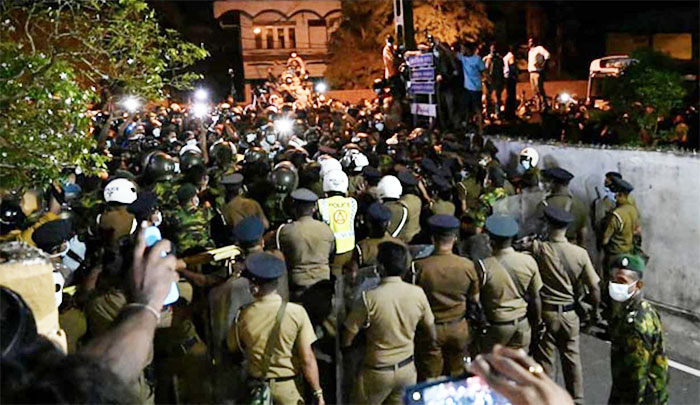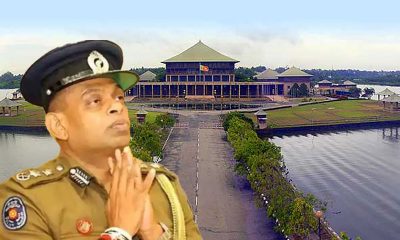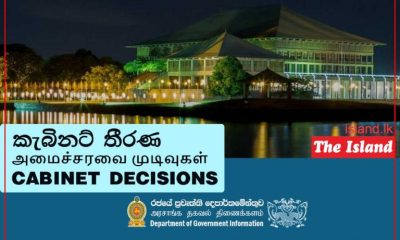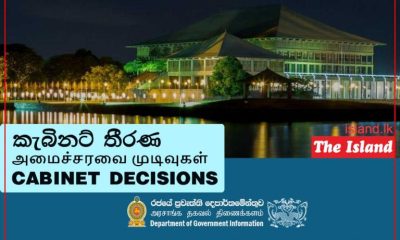Features
Reminiscing of Pengiriwatta, hundred hours later!

By Austin Fernando
The 31 March afternoon protest at the Jubilee Post against the high cost of living, various shortages, etc., initially caused by a dollar shortage, gathered momentum by the evening. By late evening it grabbed the headlines both nationally and internationally; the protesters’ slogans changed from a demand for redress to their grievances to a strident call for President Gotabaya Rajapaksa’s resignation. By the following morning—on April Fool’s Day—the Presidential Media Unit (PMU) sought to make the protest out to be an uprising engineered by ‘extremists’. It was no April Fool’s joke; the PMU was dead serious although their claim was laughable.
The intelligence services would have got wind of the 31 March event beforehand. This fact was borne out by special security arrangements at the Pengiriwatte Road that night. However, the man who lectured the police personnel and urged them to be tolerant of protestors, according to later reports, was found at the Kalubowila Hospital the following morning.
I have seen a video showing a person burning an Army bus when hundreds of military, police, and Special Task Force personnel were at the site. This man is a courageous ‘extremist’ for what he did in full view of the armed police and military personnel. I hope he is in custody and has been indicted for destroying public property.
Otherwise, immediate action should be taken against the security personnel who were on duty at the time for two reasons. The destruction of public property is illegal, and the offence was apparently committed with the connivance of the security personnel, as suggested by social media, which alleged that the arson attack had been aimed at facilitating the imposition of a curfew and the declaration of Emergency. However, the people defied the curfew and emergency regulations and protests continued.
Managerial weaknesses
Most commentators gave either a political or economic twist or a combination of both to the incident. I consider it essentially a managerial issue concerning the President, and his government. Let me look at these issues from a different perspective.
Everyone, except the President and the ruling party, says that the dollar crisis is due to the government’s financial mismanagement. The blame game continues with those in power holding their predecessors responsible for the economic crisis, and vice versa. As former Prime Minister Ranil Wickremesinghe said, at the rate the buck was being passed, the blame would have to be laid at the feet of Prince Vijaya.
If the crisis has developed under successive governments why didn’t people during the Yahapalana or Suba Anagathyak, or Ranil- Sirisena Alliance, Chandrika Kumaratunga, JR Jayewardene, and R Premadasa regimes storm Ward Place, Gunasinghepura, Horagolla, Temple Trees, or Paget Road? Even during Prime Minister Sirimavo Bandaranaike’s tenure (1970-77), the people experienced hardships, albeit not to the same extent as today, but they did not besiege Tintagel, at 65 Rosmead Place, shouting, “Sirima go home!” The lady that she was, Mrs. B might have chucked up if such a thing ever happened!
The reaction of the government exhibits a lack of moral courage to accept guilt, accountability, and responsibility for its inefficiency and ineffectiveness in keeping with good governance. If it had demonstrated such courage, the people would have appreciated the President’s strength of character. They expected that of the President, who claimed to be apolitical in the run-up to the 2019 presidential election.
Negative constitutional responses
Firstly, the government’s disregard for legislative control over public finance caused the breakdown of financial management. The President, his government, and even the Speaker of the House have shown a callous disregard for Article 148, which gives Parliament the authority over public finance. In a way, why hold All-Party Meetings (APMs) when all parties in the Parliament could discuss all issues in the House?
There may have been a reason why the President did not want to expose the Minister of Finance to Parliament, but the half-witted responses from the State Minister of Finance Semasinghe only made an already bad situation worse.
The constitutional authority has a much larger implication too. The 20th Amendment enables the President to override other stakeholders including Ministers, State Ministers, any public officials, or even the Prime Minister. The fear of the President or his powers has taken a heavy toll on the other state institutions and their performance. The government is beset with demands for a referendum and elections.
It is imperative that the 20th Amendment be abolished and the 19th Amendment reintroduced with necessary improvements. Former President Maithripala Sirisena and Leader of the Opposition Sajith Premasada demanded this on 05 April 2022, in Parliament.
Respect for the rule of law is a cornerstone of good governance. The laws have not been passed by Parliament to promote the interests of the governments in power. Successive governments have disregarded the rule of law, but that does not mean it should continue.
The Opposition has been calling for a discussion of financial status, and agreements reached with foreign powers. But the government has not respected parliamentary traditions, and the Opposition’s request has not been granted. If securing the cooperation of other political stakeholders was uppermost in the minds of the government leaders, they should have cooperated by respecting parliamentary traditions and practices.
Management style
Secondly, the President’s military style of management – ‘Comply and complain’, which gives administrative leeway in decision-making, does not fit the public administration systems, especially in a troubled situation when large numbers are affected, and consultation and consensus-making pay better. “Treat verbal orders as circulars” (Hindu 26-9-2020) is not the accepted norm in public administration. Probably this difference in approach must be creating irritation and anxiety in the President when action is not taken on his verbal directives. This has led to a hierarchic system failure, evolving from Weberian times.
Preparedness
Thirdly, what we are facing is a national crisis, there should have been solutions proposed by the ‘greats’ in Viyathmaga, consisting of intellectuals who claim to be capable of ushering in prosperity. Unfortunately, this outfit has failed to live up to the people’s expectations. Those self-proclaimed experts should have had the courage to own up to their non-performance. For example, on the carbonic agriculture issue, serious studies were treated with disdain. Litro Gas managed by a top Viyathmaga member failed miserably.
They should also have called for support from other stakeholders. It is a managerial collaboration. The President and the government were elected by the people and all political parties should have done their best to solve the crisis because it is the people who suffer. I find this commitment lacking also in the Opposition. Both the government and the Opposition have put power politics before the interests of the people.
Political consensus
Fourthly, the crisis has existed for nearly twenty months, and an All-Party Meeting (APM) was held only a fortnight ago. Some in the Opposition boycotted it, probably suspecting the intentions of the government. At that event too, the approach of the Governor of the Central Bank Ajith Nivard Cabraal was antagonistic, and the President had to apologise to former Premier Ranil Wickremesinghe. It only showed the Governor’s attitude towards coping with a national crisis, which requires a concerted effort by both the government and the Opposition.
I do not blame the President personally for such weaknesses because as publicly acknowledged by him, he lacks political experience and comparatively expediency, and probably PM Mahinda Rajapaksa and others in the government are au fait with APMs. However, what is demonstrated is a lack of focus, positive attitudes, and preparedness as a team.
Failed communication
Fifthly, the Pengiriwatta protest was a response to the cumulative effect of several decisions of the government—the unplanned production and use of carbonic fertilizer, controversial tax concessions given in 2019, the mishandling of international sovereign bonds, the wrong prioritisation of development projects, alleged disposal of public assets to foreigners, etc. Some of these were resisted even by former President Maithripala Sirisena, Opposition parliamentarians, economists, academics, and business tycoons. But their concerns were pooh-poohed by the President, government spokespersons, and by the then Governor of CBSL. Therefore, it amounted to a failure in communication with stakeholders, reducing managerial cooperation.
The current wave of mass civil disobedience and public protests show what could happen when communication and the cause of natural justice (the right to be heard, a respected managerial/ legal principle) is ignored. This will be a lesson for everyone, inclusive of the protesters who aim to bring to power a new set of ‘undeclared leaders’.
Failed bureaucracy and advisors
Sixthly, senior bureaucrats and advisors have also failed. I remember how Presidents J. R. Jayewardene, R Premadasa et al respected their advisors and senior bureaucrats. I had the personal experience with President Maithripala Sirisena heeding even very critical decisions made by me along with the then-Attorney General. This was the case even with President Jayewardene as well. There were instances where we failed to convince ministers and the President, but we must continue to make representations. Overall, there was no retaliation as such, so much so that I was appointed a Secretary a short time after I had refused to carry out an irregular request made to me by President Jayewardene. There were also exceptions. Under Pohottuwa the best example of contradiction was how Secretaries of Agriculture were replaced, for reasons best known to them. We will hear about what the public officials are undergoing at present when they write their memoirs.
If views and proposals are not taken on board, it either shows their inability to convince the political authorities, or politicians’ unwillingness to heed wise counsel. Two cases in point are how financial experts advised the President and others on the need to restructure International Sovereign Bonds worth 500 million dollars and green agriculture experiments. Both were disregarded. Experts, researchers et al were removed from the planning and management system, and a medical trade unionist and a politically-affiliated priest replaced them in deciding on the fertilizer issue.
Weak coordination
Seventhly, a coordinated approach to management is lacking. The best example is how solutions are adopted in an ad hoc manner. Conflicting views end with Ministers resigning due to weakened policy implementation. The Ministry of Finance and the Governor of the Central Bank, who has now resigned, used to make contradictory statements.
Although it appears that the government wishes to go to the International Monetary Fund (IMF) and letters are probably being exchanged through our Mission in Washington, it is not publicly supported by relevant stakeholders. It is unknown whether groundwork has been done to suit the operation such as the appointment of an advisory experts’ committee in Sri Lanka, the hiring of international consultants, lawyers, approaching the Paris Club and the London Club (both informal groups of creditor nations who engage in finding workable solutions to payment problems faced by debtor nations), meeting a group of helpful countries for short-term bridging finance, and other relevant institutions that matter. Preparing a roadmap is of the essence.
The IMF operation will require tough fiscal management and foreign exchange rate management, undertaking serious reforms for which the government will have to find a consensus with the Opposition and negotiations should commence thereon.
Conclusion
It is easy for me to make these observations. These weaknesses are not easy to rectify. Besides commitment, the task requires other things such as managerial skills, serious study, etc.
Using accepted systems of planning, organising, directing, staffing, coordinating, and reviewing, adjusting budgets to suit the best financial management must be adopted. Programmes such as the ‘distribution’ of nearly Rs. 220 billion to party-men a month after the passage of the national budget must be scrapped. However, hard decisions should be made, especially if a new IMF agenda is to commence. These issues are not easy to tackle.
They may include revenue generation, expenditure rationalisation, reviewing the operation of loss-making state-owned enterprises, reviewing, and restructuring the public service, addressing the subsidies for the affected poor, coordinating with many institutions here and abroad, structural changes, and focusing on new inclusive financing avenues, etc. Hard times are projected and a united effort is required.
The public demand for recovering stolen public assets may need new legal interventions under principles of recovery, for which assistance from the UN could be obtained.
The government must consider the importance of its obligation to its electors. The Opposition must also realise it will be its turn to face the guillotine will also come if the country continues battling.
The problem is gargantuan and we should find ways and means of overcoming the daunting challenges. Essentially, we must depend on ourselves as efficient and effective operatives. Dhammapada – Stanza 160, provides us with a guide:
Atta hi attano nathoko hi natho paro siyaattana hi sudantenanatham labhati dullabham.
(One indeed is one’s refuge; how can others be a refuge to one? With oneself thoroughly tamed, one can attain refuge, which is so difficult to attain.)
In the wake of Pengiriwatte, let the government be urged to work on its managerial weaknesses. It is our responsibility- the Government and the Opposition, to work together as a nation. Others cannot be a refuge; they could only be a prop. However, whether public protests continue or fizzle out, the government and other stakeholders must act fast to avoid disaster.
Features
‘Silent Majority’ abandoned to Long-suffering in regional conflicts

 With reports emerging that India has attacked some ‘sites’ in Pakistan and Pakistan-administered Kashmir, the question could be posed whether the stage has just been set for yet another costly India-Pakistan military conflict. Sensible opinion in South Asia could only hope that wise counsel would sooner rather than later come to prevail on both sides of the divide and that they would draw back from the brink of full-scale war.
With reports emerging that India has attacked some ‘sites’ in Pakistan and Pakistan-administered Kashmir, the question could be posed whether the stage has just been set for yet another costly India-Pakistan military conflict. Sensible opinion in South Asia could only hope that wise counsel would sooner rather than later come to prevail on both sides of the divide and that they would draw back from the brink of full-scale war.
The states concerned ought to know fully well the possible wide-ranging weighty consequences of another regional conflict. It should be plain to see that it would benefit none in the two theatres of confrontation, most particularly the relevant publics or the ‘Silent Majority’.
In fact, in connection with the mentioned initial military attacks, the Pakistani side has gone on record that some civilian lives have been lost. Such losses could burgeon in the event of full scale hostilities. These costs could of course be staggering and unimaginable in the event the nuclear option is resorted to by the sides, going forward.
Accordingly, the hope of the peace-loving world-wide is likely to be that India and Pakistan would give negotiations a chance and resolve their differences peacefully. It would be in the best interests of the world for the champions of peace to join their voices to that of UN chief Antonio Guterres and call on the sides to negotiate an end to their differences.
The utter helplessness and misery of the people of the Gaza ought to drive home afresh the horrors of war. Currently the news is that the Gazans are literally starving to death. Food and other essentials provided by UN agencies are reportedly being prevented by Israel from getting to the hapless people of Gaza. So dire is their situation that concerned quarters are calling on the compassionate worldwide to provide the Gazans with food, water and other essentials voluntarily. This SOS would need to be heeded forthwith.
Accordingly, it could be inferred that most formal arrangements, including those that are generally under the purview of the UN, geared to providing emergency humanitarian assistance to the needy, have, for all intents and purposes, been rendered ineffective in the Gaza. The UN cannot be faulted for this state of things; rather, Israel should be held accountable in the main for it.
The matter of accountability is central to the dramatic slide into lawlessness the world has been experiencing over the past few decades. As could be seen, International Law is no longer fully applicable in the conflict and war zones of the world because it is not being adhered to by many state and non-state aggressors. That the UN is hapless in the face of such lawlessness is plain to see.
We have of course the Middle East wherein International Law has fallen silent for quite a while. How could it be otherwise, when Israeli aggressions are being winked at by the US, for which the policy of backing Israel is almost sacrosanct?
Moreover, under President Donald Trump, it is difficult to see the US changing policy course on the Middle East. Trump made vague promises of bringing peace to the region in the run-up to his reelection but has done nothing concrete by way of peace-making. Consequently, complete lawlessness prevails in the Middle East. US policy towards Israel counts as another example of how the self- interest of US central administrations blinds them to their international obligations, in this case Middle East peace.
However, the commentator could be criticized as being biased if he holds only Israel responsible for what has befallen the Middle East. It has been the position of this columnist that Israel’s security needs should be taken cognizance of by its state and non-state adversaries in the Middle East and acted upon if the basis is to be laid for a durable Middle East peace. Inasmuch as Palestinian statehood must be guaranteed, the same should be seen as applicable to Israel. The latter too enjoys the right to live in a secure state of its own, unopposed by its neighbours.
The Ukraine of today is also sad testimony to the ill consequences of powerful, aggressor states wantonly disregarding International Law and its obligations. Nothing could justify Russia in invading Ukraine and subjecting it to a condition of Longsuffering. Clearly, Ukraine’s sovereignty has been violated and such excesses go to the heart of the current state of ‘International Disorder’. Of course the same stricture applies to the US in relation to its military misadventures in Afghanistan and Iraq, to name just two such modern examples.
There is no ducking the fact, then, that civilian publics in the mentioned theatres of war and outside, are being subjected to the worst suffering as a consequence of the big powers’ self-aggrandizement schemes and military misadventures. Longsuffering becomes the tragic lot of the people who have nothing to do with such unbridled power ambitions.
One would not be exaggerating the case if he states that civilian publics count for almost nothing in the present ‘International Disorder’. Increasingly it is becoming evident that from the viewpoint of the big powers and authoritarian governments the people are of little or no importance. Considering that self-aggrandizement is of the paramount interest for the former the public interest is coming to be seen as inconsequential.
Consequently, not much of a case could be made currently for the once almost reverentially spoken of ‘Social Contract’. For, the public interest does not count for much in the scrambles for power among the major powers who are seen at the popular level as the principal history-makers.
It is in view of the above that much is expected of India. Today the latter is a ‘Swing State’ of the first importance. Besides being a major democracy, it is one of the world’s principal economic and military powers. It possesses abundant potential to help to put things right in international politics. If there is one state in Asia that could help in restoring respect for International Law, it is India.
Considering the above, India, one believes, is obliged to bear the responsibility of keeping South Asia free of any more long-running, wasting wars that could aggravate the material hardships and socio-economic blights of the region. Thus, India would need to consider it imperative to negotiating peace with Pakistan.
Features
Memorable happening … Down Under

 Under the Global-Ise Australia Advanced Sports Development Programme, a delegation of 15 swimmers from Lyceum International School, Wattala, had the remarkable opportunity to train and experience high-performance sports development in Melbourne, Australia.
Under the Global-Ise Australia Advanced Sports Development Programme, a delegation of 15 swimmers from Lyceum International School, Wattala, had the remarkable opportunity to train and experience high-performance sports development in Melbourne, Australia.
The 10-day programme was carefully curated to offer intensive training, educational exposure, and cultural experiences for the young athletes.
The swimmers underwent specialised training through Swimming Victoria’s elite programme, held at some of Melbourne’s premier aquatic facilities.

Visit to Victorian Parliament
Each day began as early as 5:00 a.m. and continued until 7:00 p.m., ensuring a rigorous and enriching schedule that mirrored the standards of international competitive swimming.
Beyond training, the programme offered a wide array of experiences to broaden the students’ horizons.

Morning training
The tour group explored iconic landmarks such as the Victorian Parliament and the Melbourne Cricket Ground (MCG), and enjoyed shopping at Chadstone – The Fashion Capital. They also experienced the natural beauty of Victoria with visits to Yarra Valley Chocolaterie & Ice Creamery, and Cardinia Reservoir Park, where they observed kangaroos in their natural habitat.
An academic highlight of the tour was the group’s exclusive visits to three of Australia’s leading universities: the University of Melbourne, Monash University, and Deakin University. These visits aimed to inspire students and showcase the vast educational opportunities available in Australia.

Checking out the scene at Yarra Valley Chocolaterie & Ice Creamery
As part of the cultural immersion, Global-Ise hosted a traditional Australian BBQ at the Tim Neville Arboretum in Ferntree Gully. The students also enjoyed a variety of diverse culinary experiences each evening, further enriching their understanding of local and international food cultures.
The tour concluded with a celebratory dinner at the Spicy Wicket Restaurant, where each participant received a presentation in recognition of their involvement.

Enjoying an Aussie BBQ for lunch
The evening was made especially memorable by the presence of Pradeepa Saram, Consul General of Sri Lanka in Victoria.
Global-Ise Management—Ken Jacobs, Johann Jayasinha, and Dr Luckmika Perera (Consultant from the University of Melbourne)—did a magnificent job in planning and the execution of the advanced sports programme.

Coaches from Sri Lanka presenting a plaque to Global-Ise Management team
Ken Jacobs (centre), Johann Jayasinha, and Dr Luckmika Perera (on the right
Features
Bright, Smooth Skin

 Hi! How’s the beauty scene keeping with you?
Hi! How’s the beauty scene keeping with you?
Phew, this heat is awful but there is nothing that we can do about it.
However, there are ways and means to take care of your skin and I will do my best to help you in every way I can.
Well, this week, let’s go for a Bright, Smooth Skin.
Gram flour (also known as besan) is a traditional skincare ingredient known for its:
* Natural exfoliating properties.
* Ability to absorb excess oil.
* Gentle brightening and tan-removal effects.
* Suitability for all skin types, especially oily and acne-prone skin.
You will need 01–02 tablespoons gram flour (besan) and rose water, or raw milk, to make a paste.
You could add the following two as optional add-ins: A pinch of turmeric (for extra glow), and a few drops of lemon juice (for oily skin and pigmentation)
Add the gram flour to a small bowl and mix in the rose water (for oily/sensitive skin) or raw milk (for dry skin) slowly.
Stir well to make a smooth, spreadable paste—not too thick, not too runny.
Now apply this mixture, evenly, to your damp face and neck, and let it sit for 5–10 minutes (don’t let it dry completely if you have dry skin).
Gently massage in circular motions using wet fingers—this helps exfoliate.
Rinse off with lukewarm water, and then pat your skin dry.
Use it 02–03 times a week for best results.
Skin Benefits:
* Removes dirt, sweat, and oil without stripping natural moisture.
* Gently exfoliates dead skin cells, revealing smoother skin.
* Brightens the complexion and fades mild tanning.
* Helps clear clogged pores and reduce pimples.
* Leaves skin fresh and glowing—perfect for humid climates.
-

 News7 days ago
News7 days agoRanil’s Chief Security Officer transferred to KKS
-

 Opinion5 days ago
Opinion5 days agoRemembering Dr. Samuel Mathew: A Heart that Healed Countless Lives
-

 Business3 days ago
Business3 days agoAitken Spence Travels continues its leadership as the only Travelife-Certified DMC in Sri Lanka
-

 Business3 days ago
Business3 days agoLinearSix and InsureMO® expand partnership
-

 Latest News1 day ago
Latest News1 day agoNPP win Maharagama Urban Council
-

 Business7 days ago
Business7 days agoCCPI in April 2025 signals a further easing of deflationary conditions
-

 Features7 days ago
Features7 days agoExpensive to die; worship fervour eclipses piety
-

 Features5 days ago
Features5 days agoTrump’s economic missiles are boomeranging





















